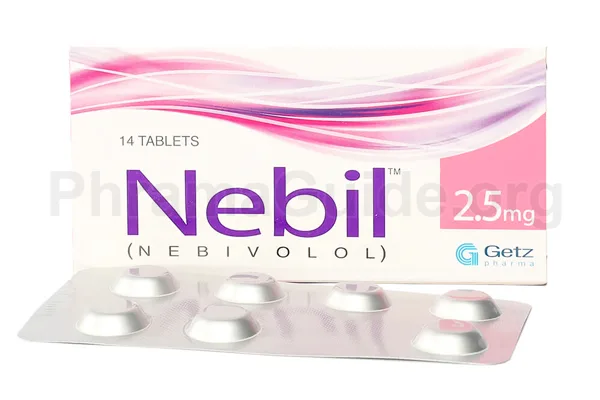Nebil is a beta-blocker medication primarily used to treat high blood pressure (hypertension). While Nebil is generally well-tolerated, it can produce side effects in some individuals, which can vary from person to person health conditions. Here are some common and less common side effects associated with Nebil.
Common Side Effects
- Fatigue or tiredness: Some individuals might experience increased feelings of fatigue or reduced energy levels while taking Nebil.
- Dizziness or lightheadedness: Nebil can lower blood pressure, leading to a drop when changing positions (like standing up quickly), resulting in dizziness or lightheadedness.
- Headache: Headaches, ranging from mild to moderate, can occur, especially at the start of treatment or with dosage adjustments.
- Nausea or upset stomach: Some people might experience mild gastrointestinal disturbances like nausea, stomach discomfort, or even vomiting.
- Insomnia or sleep disturbances: While Nebil isn’t typically associated with sleep issues, some individuals may experience changes in sleep patterns or difficulties falling asleep.
- Cold extremities: Beta-blockers can sometimes reduce blood flow to the extremities, leading to sensations of coldness in the hands and feet.
- Slow heart rate (bradycardia): Nebil, as a beta-blocker, can decrease heart rate, especially in individuals with pre-existing heart conditions or those taking high doses.
- Sexual dysfunction: Some individuals might experience decreased libido or other sexual side effects while taking Nebil.
Less Common Side Effects
- Orthostatic hypotension: Nebil can sometimes cause a sudden drop in blood pressure when standing up, leading to symptoms like dizziness or fainting. This is more common in elderly individuals or those taking higher doses.
- Depression or mood changes: While rare, some people may experience changes in mood, including symptoms of depression or anxiety.
- Breathing difficulties: In rare cases, Nebil can exacerbate respiratory issues, particularly in individuals with pre-existing lung conditions like asthma or chronic obstructive pulmonary disease (COPD).
- Worsening of heart failure symptoms: Though Nebil is often used to manage heart failure, in some rare instances, it might lead to worsening symptoms, such as shortness of breath or swelling in the legs.
- Skin reactions: There have been reports of skin-related side effects, such as rash, itching, or hives, although these occurrences are infrequent.
- Liver function abnormalities: Nebil might cause changes in liver function tests in rare cases, though serious liver problems due to Nebil are uncommon.
- Vision changes: Some individuals might experience blurred vision or other visual disturbances while taking Nebil.
- Gastrointestinal issues: Less commonly, Nebil might cause gastrointestinal problems like diarrhea or constipation.

What is Nebil?
Nebil is one of the leading brands of Nebivolol, manufactured and marketed by Getz Pharmaceuticals (Pvt) Ltd, Pakistan.
Nebil : Available Formulations and Strengths
Presently, Nebil is available in Tablet Form with the following strengths.
Nebil Tablets : 2.5mg and 5mg strengths
What Are The Possible Drug Interactions of Nebil?
- Other Beta-Blockers: Concurrent use of Nebil and other beta-blockers can lead to an increased risk of side effects and may diminish the effectiveness of both drugs.
- Calcium Channel Blockers: Combining Nebil with calcium channel blockers, particularly those that also affect the heart rate, can lead to an additive effect on heart rate and blood pressure.
- Antiarrhythmics: Medications used to treat irregular heart rhythms, such as amiodarone or disopyramide, can interact with Nebil, potentially affecting heart rate and rhythm.
- Digoxin: Nebil can increase the levels of digoxin in the blood, potentially leading to toxicity. Monitoring of digoxin levels is recommended if used concomitantly.
- Clonidine: Abrupt withdrawal of clonidine (used to treat high blood pressure) in patients taking Nebil can lead to a rapid increase in blood pressure.
- Monoamine Oxidase Inhibitors (MAOIs): Concurrent use of Nebil with MAOIs can result in severe hypertensive reactions.
- Nonsteroidal Anti-Inflammatory Drugs (NSAIDs): NSAIDs, such as ibuprofen or naproxen, can reduce the antihypertensive effects of Nebil and increase the risk of kidney problems.
- Certain Antidepressants: Serotonin-norepinephrine reuptake inhibitors (SNRIs) and tricyclic antidepressants can enhance the blood pressure-lowering effects of Nebil and increase the risk of hypotension.
- Insulin and Oral Antidiabetic Agents: Nebil may mask some of the symptoms of low blood sugar (hypoglycemia), making it important to monitor blood sugar levels closely in diabetic patients.
- Ritonavir: The antiretroviral medication ritonavir can increase the blood levels of Nebil, potentially leading to an increased risk of side effects.

Leave A Comment